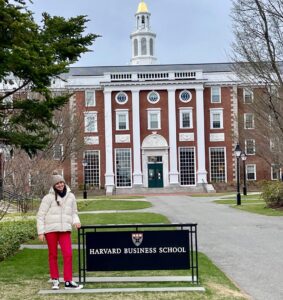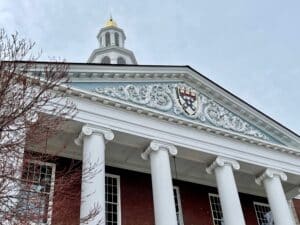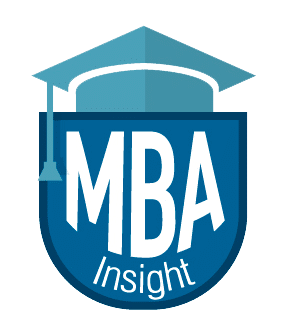Demand for MBA deferred admission programs among college seniors has skyrocketed in recent years. At MBAInsight, we often interview MBA Admissions Officers to gather insight that benefits prospective MBA applicants.
Here, we interviewed Geri who is a Senior MBA Admissions Consultant at Stacy Blackman Consulting and a former HBS Admissions Officer, who worked at HBS for seven years and during the inception of HBS’s deferred MBA admission program, called 2+2. In this interview, we will cover:
- Impetus for the MBA Deferred Admission 2+2 Program
- Concerns & Cautions about College Seniors for Deferred MBA Admission
- Admissions Stats for 2+2: Size & Yield
- Deferred Admission Admits and Students: Measures of Success
- Is MBA Deferred Admission for any and every College Senior? Who Should Apply?
- HBS 2+2 Essay Advice
We hope you find this Q&A with Geri about Harvard Business School’s 2+2 program valuable. Email the team at Stacy Blackman Consulting if you have any feedback or need additional guidance: info@stacyblackman.com, after reading the extensive insights below.

1) Were you at HBS during the inception of the 2+2 deferred MBA admission program and, if so, what were the main reasons and main concerns/ reservations about the program?
Yes, I was at HBS during the inception of the 2+2 program.
The idea behind it was two-fold:
A) To capture applicants early, who might not otherwise consider business school. Essentially folks going into “non-traditional” business school paths that after starting down those paths, are unlikely to apply to b-school. This includes people working in science, engineering, technology, industrials, and entrepreneurial roles.
B) Diversify the years of experience represented in the MBA classroom to include people who are eager to learn, have recently been in a classroom setting, and will bring their enthusiasm and openness to the case method.
The main reservations about the program centered around the earlier career folks ability to “hold their own” in a classroom with more tenured folks. With fewer years of work experience, there was a question if they would be able to contribute to discussion and be valuable members within team projects and field programs. There was also a reservation as to whether the more experienced students would accept the 2+2’ers into the fold. Understandably, most students entering the program had an expectation of who their classmates would be, and what they would learn from them. And 2+2 threw a wrench into this idea.
2) How did HBS ensure there was awareness and demand for the college senior program in the early years?
There was some historical data within the applicant pool demonstrating a level of interest from early career folks. A number of applications would come in from this group each year, despite there not being a place for them. Additionally, HBS promoted 2+2 to undergraduate populations via graduate school fairs, panels, career offices, etc and eventually (after determining 2+2 was a success), added in online advertising to increase awareness. It’s also important to note that the expectation was always that 2+2’ers would be a somewhat small percent of the overall class (~10%), so the interest level did not have to be huge to meet this goal.
3) What was the target class size for 2+2 admits specifically each year and did that vary over the years? Was there any type of breakdown such as gender, STEM vs traditional employment that was tracked for 2+2 admits?
The target # of admits in the early years of the program was around 80 – 100. The targets were conservative as the program was getting off the ground and the school was in the midst of evaluating the success of it. Over time, the # of admits grew to 100 – 115.
Given the focus of the 2+2 program, the profile leaned heavily on admits within engineering and math/science both in their undergraduate major and 2 year career plans. Although not impossible, it was much more difficult to be admitted via 2+2 if your plan was to enter banking or consulting after undergrad.
4) GSB’s deferred program came a few years after HBS. Did HBS track when GSB announced its college senior program?
HBS was certainly aware of GSB offering a deferred program, similar to that of the HBS 2+2 program. The schools are in close contact with one another and often keep a close eye on trends, experiments, etc – whether it be deferred admits or accepting the GRE or adding a global travel component to the curriculum.
![]()
ADVICE ON all MBA DEFERRED ADMISSIONS PROGRAMS: HBS, GSB, WHARTON
To view how Stacy Blackman Consulting and other MBA admissions consulting firms stack up, check out the link below:
TOP MBA ADMISSIONS CONSULTING FIRMS OF 2023
5) What percentage ended up matriculating of the 2+2 admits and how did HBS ensure maximum yield matriculation. What percentage accepted the admit offer approx or is the sample size too small? Would a 2+2 admit need to sign a binding clause that they would not apply elsewhere along with a deposit?
The yield for 2+2 admits was very high, generally between 95-98%. The school understood there was an inherent risk involved – it was unclear if admits would leave their jobs after 2 years to enter the MBA program. To ensure high matriculation, the admissions office maintained contact with the admits over the course of their 2 years of work. There were various communications and check-in points to ensure the school was aware of admits’ intentions.
One thing to note is that many 2+2 admits requested additional years of work prior to entering the MBA program. Over time it became clear that a policy needed to be put in place around the timing for requests and the maximum # of years allowed. While HBS wanted to allow for flexibility for those folks that planned to change industries or companies or received a promotion, there was a tension with maintaining the spirit of the program to admit early career students. Currently, the program allows up to 4 years of work experience prior to entering the MBA program.
Admits into 2+2 are asked to sign a letter of acceptance agreeing not to apply to any other MBA programs and to provide a deposit as a commitment to the program.
6) What measures of success did HBS track for its 2+2 program and 2+2 students in general?
HBS tracked number of applications, yield rate, demographics, # of undergrad schools represented, # of undergrad majors, etc as measures of success. In addition, in the early years of the program, there were surveys done to ensure the 2+2 students were participating inside and outside the classroom (and taking leadership roles) at the same rate as their classmates. And thankfully they were! There appeared to be little identifiable difference among the 2+2’ers. Some students indicated they had no idea who the 2+2’ers were, unless they self-identified.
 7) Do you recommend any college senior try for HBS or only if they meet specific thresholds and if it’s the latter, what would you describe those thresholds to be (other than the basic app requirements)?
7) Do you recommend any college senior try for HBS or only if they meet specific thresholds and if it’s the latter, what would you describe those thresholds to be (other than the basic app requirements)?
I would not recommend that any college senior apply to the 2+2 program. (Although there are plenty of other amazing deferred programs to consider as well!). While there is no major downside to applying (being denied admission to 2+2 will not hurt your chances later), there’s the time and effort to consider. It’s better to hold off until you can put your best application together. For 2+2, you need to be at the very top of your undergraduate class across all measures – academics, extracurriculars, and leadership roles. And your recommenders must reinforce all of this. Even beyond this, people who get admitted into 2+2 are extraordinary. They are not your “typical” college senior (or master’s degree student) – they bring something more.
8) Were there naysayers at HBS Admissions or among the HBS faculty about 2+2 due to the young aspect of students? Did that change into 100% support for the program as 2+2 students matriculated?
I wouldn’t say there were naysayers among HBS Admissions or HBS faculty but there were certainly reservations. It was unclear if 2 years of work would be enough to meaningfully contribute to the case method discussion and be an equal player on project teams. There were some who were skeptical, but willing to experiment. And after the data came back from students and faculty proving it’s success, I would say there was near 100% support.
9) Any advice to 2+2 applicants for their essay?
My advice to 2+2 applicants around the essay would be to show your true self as much as you can. The upside is that you’re not expected to come to the table with a depth of work related strengths and learnings, so you can use the essay to highlight what makes you interesting, different, special – what would be missing from the classroom if you weren’t there?
Here’s a link to the HBS application requirements.
ADVICE ON all MBA DEFERRED ADMISSIONS PROGRAMS: HBS, GSB, WHARTON
To view how Stacy Blackman Consulting and other MBA admissions consulting firms stack up, check out the link below:
TOP MBA ADMISSIONS CONSULTING FIRMS OF 2023

